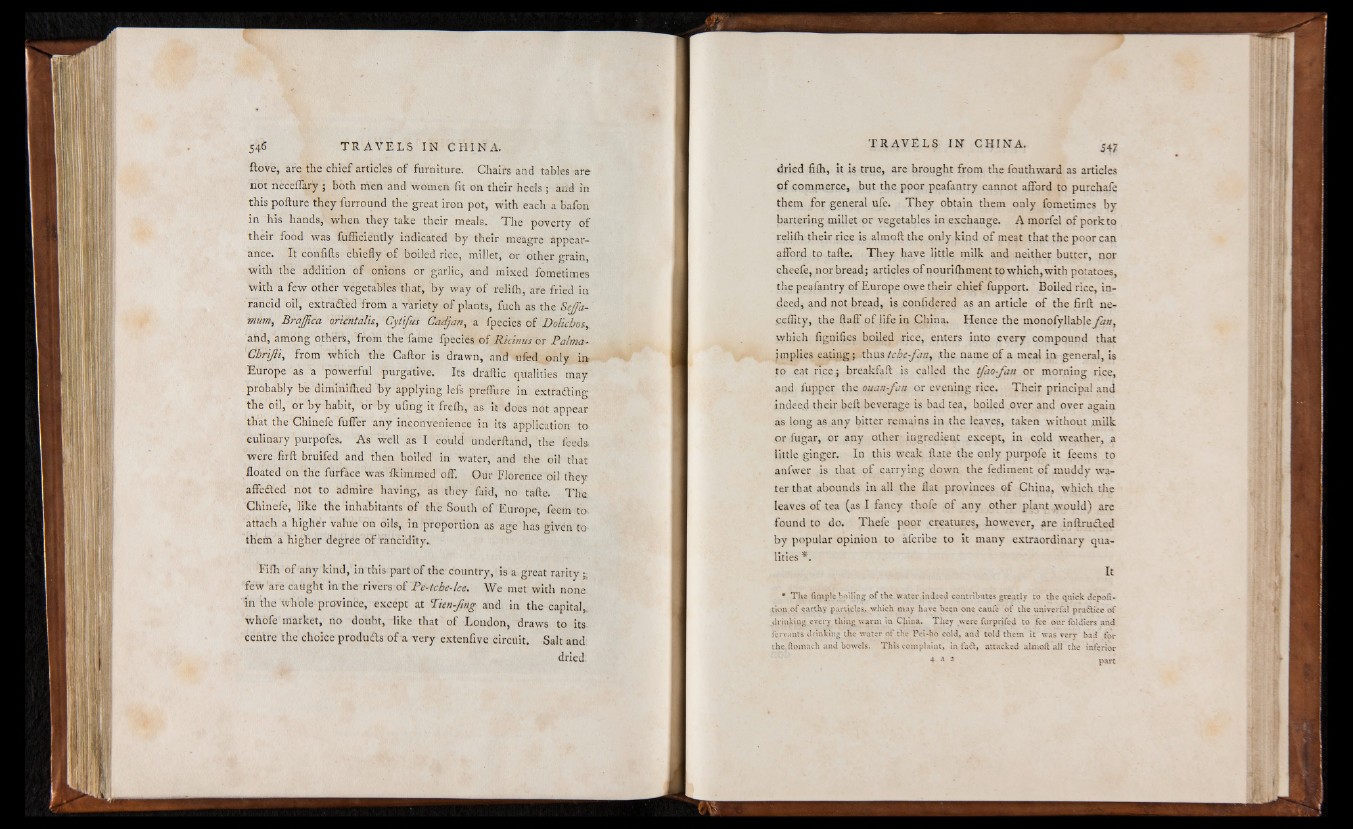
ftove, are the chief articles o f furniture. Chairs and tables are
not neceffary ; both men and women fit on their heels ; and in
this pofture they furround the great iron pot, with each a bafon
in his hands, when they take their meals. The poverty o f
their food was fufficiently indicated by their meagre appearance.
It confifts chiefly o f boiled rice, millet, or other grain,
with the addition o f onions or garlic, and mixed fometimes
■with a few other vegetables that, by way o f reliih, are fried in
rancid oil, extraded from a variety o f plants, fuch as the SeJJa-
mum, BraJJica oriental™, Cytifus Cadjan, a fpecies o f Dolicbot,
ahd, among others, from the fame fpecies o f Ricinus or Palma-
Chrifii, from which the Caftor is drawn, and ufed only in
Europe as a powerful purgative. Its draftic qualities may
probably be diminifhed by applying lefs preffure in extra&ing
the oil, or by habit, or by ufing it frefh, as it does not appear
that the Chinefe fuffer any inconvenience in its application to
culinary purpofes. A s well as I could underftand, the feeds
were firft bruifed and then boiled in water, and the oil that
floated on the furface was ikimmed off. Our Florence oil they
affedted not to admire having, as they faid, no tafle. T he
Chinefe, like the inhabitants o f the South o f Europe, feem to-
attach a higher value on oils, in proportion as age has given to
them a higher degree o f rancidity..
Fiih o f any kind, in this part o f the country, is a great rarity g
few'are caught in the rivers o f Pe-tcbe-lce. We met with none
in the whole province, except at Bien-J'tng and in the capital,
whofe market, no doubt, like that o f Loudon, draws to its
centre the choice produdts o f a very extenfive circuit. Salt and
dried.
T R A V E L S IN CHINA. 547
dried fiih, it is true, are brought from the fouthward as articles
o f com pierce, but the poor peafantry cannot afford to purchafe
them for general ufe. T h e y obtain them only fometimes by
bartering millet or vegetables in exchange. A morfel o f pork to
reliih their rice is almoflt the only kind o f meat that the poor can
afford to tafte. The y have little milk and neither butter, nor
cheefe, nor bread; articles ofnouriihment towhich,with potatoes,
the peafantry o f Europe owe their chief fupport. Boiled rice, indeed,
and not bread, is confidered as an article o f the firft ne-
ceffity, the ftaff o f life in China. Hence the monofyllable fa n ,
which fignifies boiled rice, enters into every compound that
implies eating; thus tc b e fin , the name o f a meal in general, is
to eat ric e ; breakfaft is called the tfao-fan or morning rice,
and fupper the ouan-fan or evening rice. Their principal and
indeed their beft beverage is bad tea, boiled over and over again
as long as any bitter remains in the leaves, taken without milk
or fugar, or any other ingredient except, in cold weather, a
little ginger. In this weak ftate the only purpofe it feems to
anfwer is that o f carrying down the fediment o f muddy water
that abounds in all the flat provinces o f China, which the
leaves o f tea (as I fancy thofe o f any other plant would) are
found to do. Thefe poor creatures, however, are inftruded
by popular opinion to afcribe to it many extraordinary qualities
’
It
* The iimplc boiling o f the water indeed contributes greatly to the quick depoli-
ticm o f earthy particles, which may have been one caufe of the univerfal pra&ice o f
drinking every thing warm in China. They were furpriied to fee our ioldiers and
fervants drinking the water of the Pei-ho cold, and told them it was very bad for
the.flomach and bowels* This complaiut, in fa&> attacked almoft all the inferior
4 A 2 | part
■ ■ ■ ■ ■ ■ ■ ■ ■